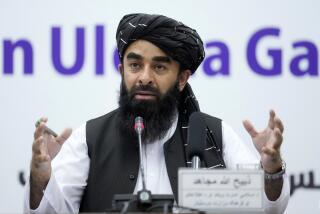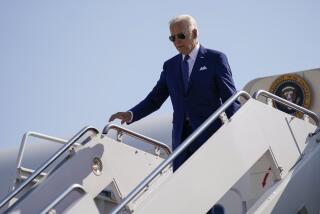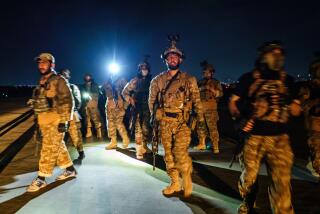Talks on U.S. future in Afghanistan make headway
WASHINGTON — U.S. and Afghan officials claimed progress Saturday in long-running negotiations that will determine whether American forces remain in Afghanistan after next year, but said the key issue of immunity for U.S. troops from local prosecution remained unresolved.
After hours of talks between President Hamid Karzai and Secretary of State John F. Kerry in Kabul, the Afghan leader said the issue of which country would have jurisdiction after 2014 over any crimes committed by U.S. forces would have to be resolved by an assembly of Afghan elders and by his nation’s parliament.
“It was a hard discussion,” Karzai told reporters at a news conference that had been postponed three times as talks were extended. “Afghanistan had its own vision and interests, and the United States had its own vision and interests.”
Kerry said the U.S. could prosecute any crimes committed by American armed forces.
“The one issue that is outstanding is the issue of jurisdiction,” Kerry said as he met alongside Karzai with reporters. “We need to say that if the issue of jurisdiction cannot be resolved, unfortunately there cannot be a bilateral security agreement.”
U.S. officials have long insisted that their troops around the world be insulated from local prosecution.
U.S. and Afghan officials said they had made progress on other issues and had a draft agreement. They face an end-of-the-month deadline for a long-term security agreement.
Karzai said the draft framework agreement included his demands for the protection of Afghan sovereignty and rules on how military operations are to be carried out on Afghan territory.
“Tonight we reached some sort of agreement,” Karzai told reporters. U.S. forces “will no longer conduct operations by themselves. We have been provided written guarantee of the safety of the Afghan people. And a clear definition of ‘invasion’ was provided.”
President Obama has long promised there would be at least a small residual U.S. military force in Afghanistan after 2014, and a failure to reach an agreement would be a setback after the 12-year U.S. commitment. The administration failed in its efforts to win Iraq’s consent for a residual force there, leading to a U.S. troop withdrawal in December 2011.
Kerry signaled the gravity of the issue by traveling Friday to Afghanistan to meet with Karzai.
The issue of how much autonomy U.S. forces might have after 2014 was punctuated in recent days by the announcement that American troops this month had captured Latif Mehsud, a senior deputy to the leader of the Pakistani Taliban, as he traveled in eastern Afghanistan’s Logar province. Afghan intelligence and security officials reportedly were not happy about the U.S. operation, saying that Mehsud was in their custody when he was forcibly taken by U.S. troops.
U.S. authorities have signed previous agreements with Afghanistan that promised close U.S.-Afghan collaboration in fighting terrorism. But Afghan officials contend that U.S. officials have not lived up to the terms.
Karzai has complained bitterly in recent days about perceived American violations of Afghan sovereignty. But Kerry has long experience in dealing with the mercurial Afghan leader, and has been unfazed by his harsh bursts of criticism of U.S. tactics.
Karzai and his weak government are dependent on American military might and cash. But he also needs to deflect the anger of Afghans about the damage and humiliation they believe are often caused by U.S. troop activities.
Also on Saturday, a suicide car bomber in a Toyota Corolla detonated his explosives at the entrance to the main police headquarters in the eastern city of Jalalabad, killing two police officers and two civilians, said Ahmad Zia Abdulzai, the governor’s spokesman for Nangarhar province. The blast also wounded five police officers and two civilians, he said.
Times staff writer Richter reported from Washington and special correspondent Baktash from Kabul. Times staff writer Mark Magnier in New Delhi contributed to this report.
More to Read
Start your day right
Sign up for Essential California for news, features and recommendations from the L.A. Times and beyond in your inbox six days a week.
You may occasionally receive promotional content from the Los Angeles Times.







